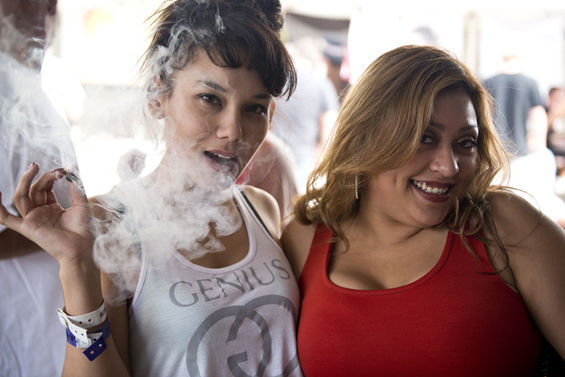Whatever else it is, marijuana is now a business, as evident from our cover story this week. The pot entrepreneurs who are seeking state licensing and accreditation are preoccupied with the everyday capitalist concerns of real estate, financing, branding and snapping up urls.
In this new era of “Marijuana Inc.,” as Fortune magazine has called it, it’s not hard to imagine a trademark war breaking out. In fact, it already has.
Witness a case that is playing out in U.S. District Court of Western Washington. In late August, Trans-High Corporation, publisher of New York-based High Times, filed suit against a Bellingham medical marijuana dispensary owner named Martin Nickerson.
At the time, Nickerson was getting ready to hold an event called Northwest Harvest Fest on a 20-acre plot of land he owns in the Skagit Valley town of Bow. The festival, an annual event promoted as a celebration of cannabis culture, was to feature speakers, food and music, including a performance by Jamaican hip-hop artist Ky-Mani Marley ($50 for a one-day pass, $70 for a two-day one). It was also to stage a so-called “Cannabis Cup,” in which pot products would be judged.
The issue for High Times? The organization was also holding a Cannabis Cup in Seattle at the very same time ($50 for a day-pass; $269 for a “super VIP” two-day pass, including a “commemorative T-shirt,” gift bag, entrance to a party featuring performers Slightly Stoopid and Redman and “access to roped-off front-of-stage concert viewing area”). One of the entrepreneurs featured in SW’s cover story, high-end pastry chef Molly Poiset, won second place in the “best edible” category.
As far back as 2000, High Times, which holds such events across the country and in Amsterdam, had filed for a trademark on the words “Cannabis Cup.” And the U.S. Patent and Trademark Office granted it, as confirmed by government records available online. And the publication didn’t take kindly to Nickerson using its trademarked name. Its complaint accused him of attempting “to profit from the goodwill plaintiff has developed in its Cannabis Cup brand and mislead the consuming public.”
Nickerson, on the other hand, didn’t take kindly to a New York company coming to Seattle and trying to, as he puts it, “push the little guy around.” He calls the High Times folks “carpetbaggers.”
“It’s funny to me that everyone who seems to get their hand caught in the cookie jar tries to present himself as David vs. Goliath,” retorts Doyle.
Nickerson went ahead and held his festival. He laughs as he recallsd a memorable moment–he and voluable activist Steve Sarich, dressed a cop, lighting a two-point jont. (See the much-watched YouTube video.)
Despite the antagonism, Nickerson and High Times have reached a tentative settlement, according to David Holland, another lawyer for the publication. He declines to discuss the terms.
High Times may have an incentive for settling, and thereby keeping the case from coming before a federal judge. Given the federal prohibition on pot, it’s not certain how such a judge would look upon the Cannabis Cup trademark. Doyle insists that the company faced no risk, that a trademark on any good and service that doesn’t specifically violate the Controlled Substances Act is ironclad. He uses the example of a book that advocates for the legalization of marijuana.
“We are all about the Fist Amendment,” adds Holland, saying that the “entire ethos” of the Cannabis Cup focuses on “education.”
But that might not be how a federal judge would see the event, described on its webside as one where, thanks to legalization Initiative 502, “adults can experience the best Washington cannabis products freely.” Robert McVay, an attorney with Seattle-based Canna Law Group, says that a federal judge could determine that any trademark on the “knife edge” of legality was granted improperly, and throw it out.
Meanwhile, Nickerson has his own reasons for settling. He’s preocuppied with criminal charges stemming from a raid last year on his dispensary, Northern Cross Collective Gardens, which coincided with the Joint dispensary raid noted in our cover story.








